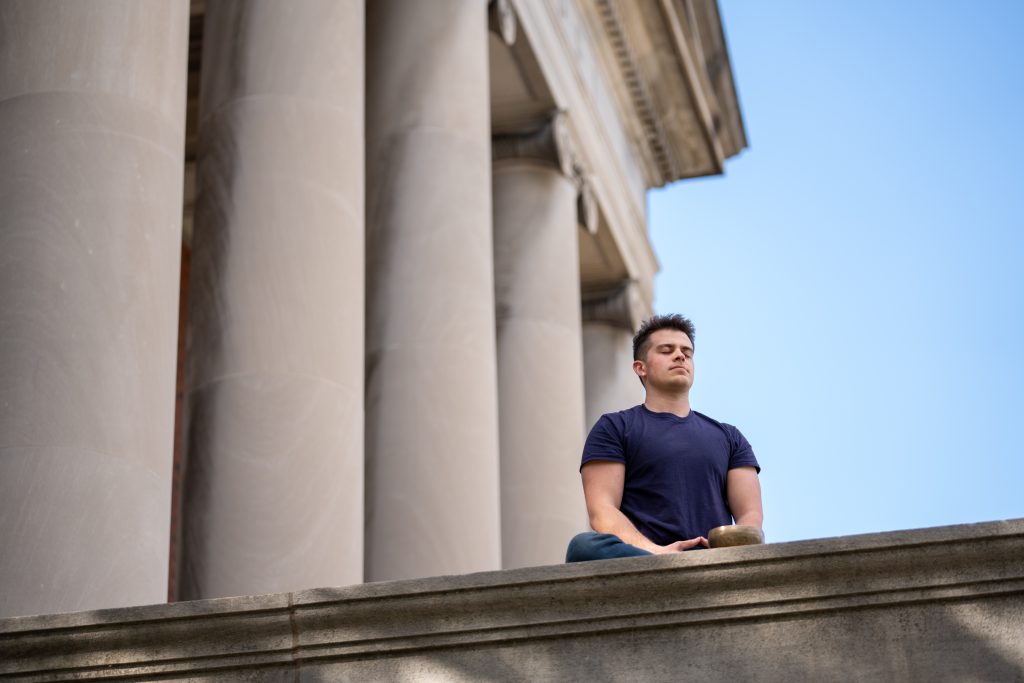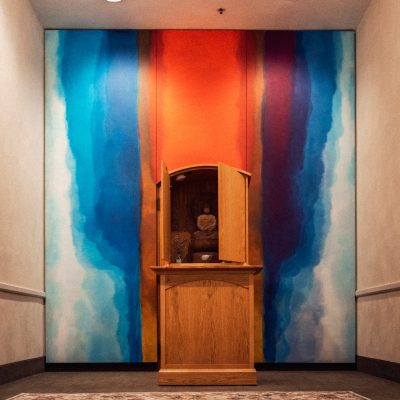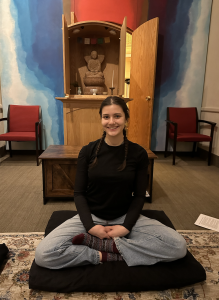When Sensei JoAnn Cooke began as a Buddhist chaplain at Hendricks Chapel, she had no idea of the coming global pandemic and the impact it would have at Syracuse University and throughout the world. While Cooke and fellow Buddhist Chaplain Sensei Jikyo Bonnie Shoultz worked together to plan weekly meditations and outings to the Syracuse Zen Center, the world shifted in the spring of 2020, and so did Cooke’s plans. As the Buddhist Chaplaincy practiced social distancing and moved into regular Zoom meditations and sangha meetings (gatherings in which the students can talk and share), Cooke observed the students’ needs more clearly and adjusted her plans accordingly.

“People were lonely. They had a lot of anxiety,” recalled Cooke. She knew the need for meditation and mindfulness would increase as students returned to campus in the fall of 2020. That’s when she put together the Mindfulness Certification program. Some of the students who showed interest in the program were already invested in their meditation practice, but many others were curious about meditation and nervous to try it. While some participants identify as Buddhist, most come from other backgrounds (including faith-based and atheist/agnostic) and gather to embrace the spiritual benefits of meditation and mindfulness.
The students who came together for meditation and the weekly sangha meetings felt like they had found a sense of belonging. “When you’re in a group, you just see that you’re not the only one who feels pain,” said Cooke.
The Mindfulness Certification has three levels. The first level entails attending a beginners’ workshop that includes how to sit in meditation and how to deal with discomfort. The student must attend one or more meditations per week and keep a short journal. About 40 students have completed the first level of certification.

The Buddhist altar in Hendricks Chapel’s Small Chapel (Photo by Solon Quinn)
Why develop a certificate for meditation? “Your brain is going to tell you that you don’t have time to do ‘nothing’ for half an hour; you’re very busy and you shouldn’t do it,” Cooke says. “But if you tell your brain, ‘I’m getting a certificate!’ your brain is going to understand that you’re gaining credentials.” However, she adds that the real payoff isn’t a piece of paper, your well-being is where the real benefits lay.
Caroline Moller ’24 will receive her Level 2 certificate this semester. As a senior studying forensic science and psychology in the College of Arts and Sciences, she notes many benefits for both her personal and professional well-being. Just about a year ago, Moller’s friend asked her to attend a meditation session. Before that, other trusted people in her life had recommended meditation. “It was never something I saw myself capable of doing, because I had always been a highly anxious person,” she says. “My life has been changed ever since for the better.”
Not only did Moller feel that she received personal benefits from her involvement, but also that the entire group was collectively recovering from trauma and stress. “Being a part of this group has acted as a healing process,” she says.
University staff member Robin Summers started her mindfulness practice in 2018. Currently, as an assistant director in admissions, she is grateful for her mindfulness training with Cooke and others. She travels often to recruit future students and feels the benefit of the lessons she has learned. “I can tell when I am meditating and when I’m not. I can physically and mentally feel it,” she says. “As a parent and a caregiver for older parents, my ability to manage the noise in my life is much better.”
Avid practitioner Joe Perez, a senior at the State University of New York College of Environmental Science and Forestry (SUNY-ESF), started meditation after his therapist introduced a visualization practice during a session. Perez realized that meditation would be a helpful addition to his regular therapy sessions, and he has since learned to calm his emotions and think through situations logically.
For those seeking care for mental health, mindfulness training is one of many options.* Mindfulness practices are considered a healthy supplement to medication and other modes of therapy, like Dialectical Behavior Therapy (DBT).
Mindfulness, according to Cooke, is about paying attention. “Paying attention is a spiritual practice where you find joy and gratitude,” she says. “And that’s how you express compassion: paying attention to other people and their needs.”
Here are six tips for starting your mindfulness journey:
- Bring a friend! Engaging with a community or a friend can enhance your practice and provide motivation.
- Just pause. Use meditation as a tool to pause the hustle of daily life, offering a moment to regain control and perspective.
- Find a teacher. If you can’t find a teacher, try a video or podcast to get started.
- Persist with patience. Meditation is a skill that develops with practice. Embrace the process with an open heart and patience. Initial discomfort or skepticism is part of the journey.
- Reflect on the positives daily. Every day has moments of both delight and discomfort. Note those moments, and then release them.
- Just try it. You don’t need any prior knowledge about meditation before attending.
“You are not alone,” notes Cooke. “When we meditate as a group, we learn that we are all experiencing pain. There is pain and discomfort in the world, but it doesn’t last forever. Experiencing this together creates community and compassion, two things this world needs a lot more of.”

You can learn more about the Mindfulness Certificate program and the meditation schedule on the Hendricks Chapel website. Anyone from SU or SUNY-ESF is welcome to join meditations or sangha meetings. Contact Cooke at jmcooke@syr.edu to have a cup of tea and talk about your interest in meditation or in receiving mindfulness training.
*SU and SUNY-ESF students seeking mental health support can reach out to the Barnes Center at the Arch, which offers services for mental health emergencies at 315.443.8000 or barnescenter@syr.edu; faculty, staff and employee family members can contact SU’s Faculty & Staff Wellness Initiative for help with work and life challenges. The Barnes Center at the Arch also has resources for faculty and staff who are looking for guidance as they support their students. The 988 Suicide & Crisis Lifeline has resources to support yourself and help others, as well as a chat service to talk with crisis counselors around the clock.

